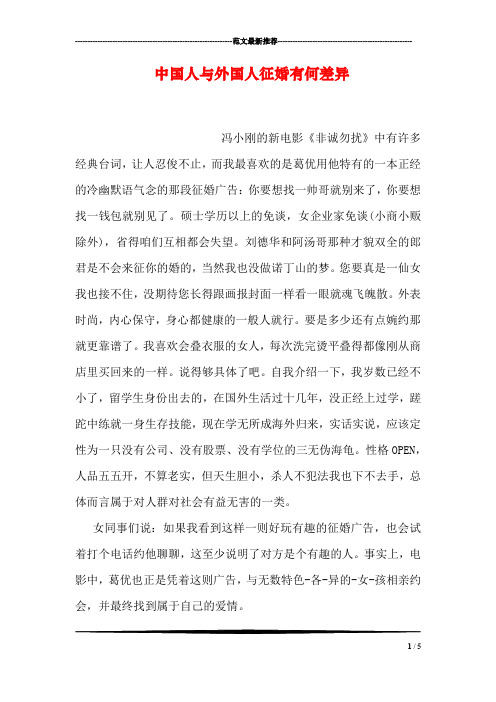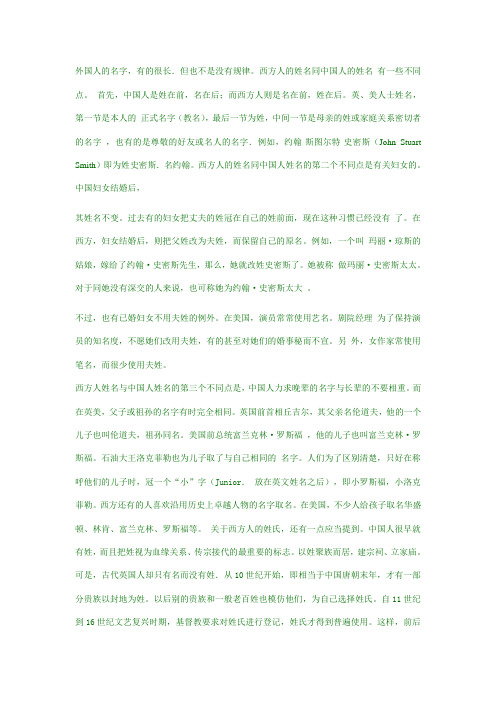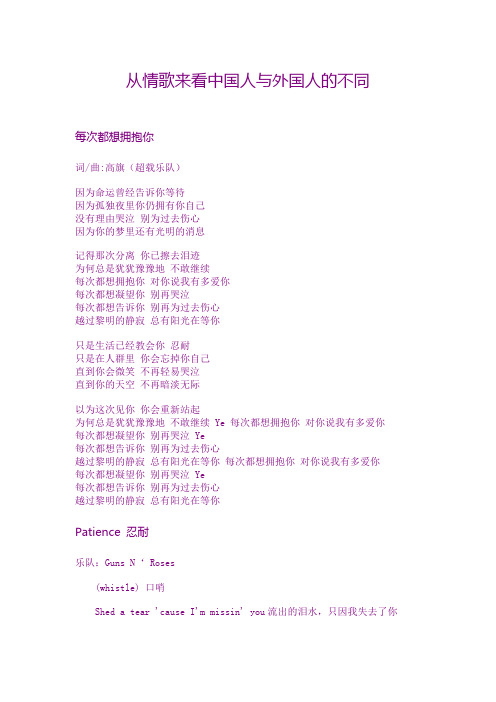外国人和中国人的区别
- 格式:doc
- 大小:1015.50 KB
- 文档页数:4

---------------------------------------------------------------范文最新推荐------------------------------------------------------中国人与外国人征婚有何差异冯小刚的新电影《非诚勿扰》中有许多经典台词,让人忍俊不止,而我最喜欢的是葛优用他特有的一本正经的冷幽默语气念的那段征婚广告:你要想找一帅哥就别来了,你要想找一钱包就别见了。
硕士学历以上的免谈,女企业家免谈(小商小贩除外),省得咱们互相都会失望。
刘德华和阿汤哥那种才貌双全的郎君是不会来征你的婚的,当然我也没做诺丁山的梦。
您要真是一仙女我也接不住,没期待您长得跟画报封面一样看一眼就魂飞魄散。
外表时尚,内心保守,身心都健康的一般人就行。
要是多少还有点婉约那就更靠谱了。
我喜欢会叠衣服的女人,每次洗完烫平叠得都像刚从商店里买回来的一样。
说得够具体了吧。
自我介绍一下,我岁数已经不小了,留学生身份出去的,在国外生活过十几年,没正经上过学,蹉跎中练就一身生存技能,现在学无所成海外归来,实话实说,应该定性为一只没有公司、没有股票、没有学位的三无伪海龟。
性格OPEN,人品五五开,不算老实,但天生胆小,杀人不犯法我也下不去手,总体而言属于对人群对社会有益无害的一类。
女同事们说:如果我看到这样一则好玩有趣的征婚广告,也会试着打个电话约他聊聊,这至少说明了对方是个有趣的人。
事实上,电影中,葛优也正是凭着这则广告,与无数特色-各-异的-女-孩相亲约会,并最终找到属于自己的爱情。
1 / 5应该说这则广告的效果,主要得益于片中主人公的海归背景,他的这则有趣的征婚广告,具有很强的西方征婚广告特-性,就是注重和张扬自己的个-性,从一而终地表现出对人的关注,向受众展示的,是征婚的人是怎么样一个人,以及他想征一个什么样的人。
这一点,与当下中国市面上流行的征-婚广告,有巨大的区别。

外国人的名字,有的很长.但也不是没有规律。
西方人的姓名同中国人的姓名有一些不同点。
首先,中国人是姓在前,名在后;而西方人则是名在前,姓在后。
英、美人士姓名,第一节是本人的正式名字(教名),最后一节为姓,中间一节是母亲的姓或家庭关系密切者的名字,也有的是尊敬的好友或名人的名字.例如,约翰·斯图尔特·史密斯(John Stuart Smith)即为姓史密斯.名约翰。
西方人的姓名同中国人姓名的第二个不同点是有关妇女的。
中国妇女结婚后,其姓名不变。
过去有的妇女把丈夫的姓冠在自己的姓前面,现在这种习惯已经没有了。
在西方,妇女结婚后,则把父姓改为夫姓,而保留自己的原名。
例如,一个叫玛丽·琼斯的姑娘,嫁给了约翰·史密斯先生,那么,她就改姓史密斯了。
她被称做玛丽·史密斯太太。
对于同她没有深交的人来说,也可称她为约翰·史密斯太大。
不过,也有已婚妇女不用夫姓的例外。
在美国,演员常常使用艺名。
剧院经理为了保持演员的知名度,不愿她们改用夫姓,有的甚至对她们的婚事秘而不宣。
另外,女作家常使用笔名,而很少使用夫姓。
西方人姓名与中国人姓名的第三个不同点是,中国人力求晚辈的名字与长辈的不要相重。
而在英美,父子或祖孙的名字有时完全相同。
英国前首相丘吉尔,其父亲名伦道夫,他的一个儿子也叫伦道夫,祖孙同名。
美国前总统富兰克林·罗斯福,他的儿子也叫富兰克林·罗斯福。
石油大王洛克菲勒也为儿子取了与自己相同的名字。
人们为了区别清楚,只好在称呼他们的儿子时,冠一个“小”字(Junior.放在英文姓名之后),即小罗斯福,小洛克菲勒。
西方还有的人喜欢沿用历史上卓越人物的名字取名。
在美国,不少人给孩子取名华盛顿、林肯、富兰克林、罗斯福等。
关于西方人的姓氏,还有一点应当提到。
中国人很早就有姓,而且把姓视为血缘关系、传宗接代的最重要的标志。
以姓聚族而居,建宗祠、立家庙。
可是,古代英国人却只有名而没有姓.从10世纪开始,即相当于中国唐朝末年,才有一部分贵族以封地为姓。

华侨、华人、华裔的区别
1、华侨
侨:qiáo
1、寄居在外地,寄居在外国:侨居。
侨胞。
侨民。
2、寄居在外国的人:华侨。
外侨。
侨眷。
华侨生在中国,中国籍,旅居国外,还是中国人。
经常说的拿了美国绿卡的人,实际上国籍还是中国的,还是中国人。
华侨分类:
1.归国华侨:指回国定居的华侨,简称归侨。
不论年龄大小和何时回国,都是归侨。
来华定居的外籍华人,在恢复中国国籍后,也称归侨。
2.华侨学生:指回中国学习,未在中国定居的华侨。
其中,从国外回来定居就学的华侨,简称归侨学生。
3.侨眷:指华侨在中国国内的眷属。
包括:配偶、父母、子女(含媳妇、女婿)、兄弟姐妹、祖父母、外祖父母、孙儿孙女、外孙儿孙女、抚养人和生活主要来源依靠华侨的其他亲属。
即使在华侨回国后,他们在国内的眷属仍为侨眷。
2、华人。

外国人和中国人关于夸赞的区别英语作文Differences between Foreigners and Chinese in Giving ComplimentsCompliments play an important role in social interactions and are a way to show appreciation and recognition for someone's achievements or qualities. However, the way in which compliments are given can vary greatly between cultures. In this essay, we will explore the differences between foreigners and Chinese people in giving compliments.1. Frequency of ComplimentsForeigners tend to give compliments more freely and more frequently than Chinese people. In Western culture, it is common to praise others for their accomplishments, appearance, or behavior in order to build rapport and show appreciation. Compliments are seen as a way to boost someone's self-esteem and make them feel good about themselves.On the other hand, in Chinese culture, compliments are given sparingly and are often perceived as insincere if given too frequently. Chinese people value humility and modesty, and it is considered polite to downplay one's achievements rather than boast about them. As a result, Chinese people may be morereserved in giving compliments in order to avoid appearing boastful.2. Content of ComplimentsThe content of compliments also differs between foreigners and Chinese people. Foreigners tend to give compliments that are direct, specific, and effusive. For example, a foreigner may say "You look stunning in that dress" or "You did an amazing job on that project" in order to express admiration and appreciation.In contrast, Chinese people are more likely to give indirect or subtle compliments that are less effusive. For example, instead of directly praising someone's appearance, a Chinese person may say "You have a good sense of style" or "Your hard work has paid off" as a way to convey admiration without being too overt.3. Response to ComplimentsThe way in which people respond to compliments also varies between foreigners and Chinese people. In Western culture, it is common to accept compliments graciously and to thank the person for their kind words. People may also return the compliment or express their appreciation in return.In Chinese culture, however, it is customary to deflect compliments and downplay one's achievements in order to showhumility. When receiving a compliment, a Chinese person may respond by saying "It's nothing" or "I don't deserve such praise" as a way to show modesty and humility. This may be confusing or off-putting to foreigners who expect a more enthusiastic response.In conclusion, there are significant differences between foreigners and Chinese people in the way they give and receive compliments. While foreigners tend to give compliments more freely and directly, Chinese people are more reserved and indirect in their praise. Understanding these cultural differences can help people navigate social interactions more effectively and avoid misunderstandings.。

外国人和中国人美食区别英语作文全文共3篇示例,供读者参考篇1Differences in Food Culture Between Foreigners and ChineseFood is an integral part of a country's culture and identity. Each country has its own unique cuisine and dining customs that reflect its history, geography, and social norms. In this article, we will explore the differences in food culture between foreigners and Chinese people.One of the most significant differences between foreigners and Chinese people when it comes to food is the variety of dishes and flavors. Chinese cuisine is known for its wide range of flavors and ingredients, with dishes ranging from spicy Sichuan hotpot to delicate Cantonese dim sum. On the other hand, Western cuisine tends to focus more on simple, bold flavors, with dishes such as steak and fries or pasta with tomato sauce.Another key difference is the way food is served and shared. In China, it is common for dishes to be placed in the center of the table and for everyone to share from the same plates. This communal style of dining promotes a sense of togetherness andsharing among diners. In Western countries, individual portions are more common, and each person orders their own dish. This can lead to a more individualistic dining experience.The importance of food in social gatherings also differs between foreigners and Chinese people. In China, food plays a central role in social interactions, with meals often serving as a way to bond with family and friends. Celebrations and festivals are marked by elaborate feasts, where special dishes are prepared to honor the occasion. In Western countries, while food is still an important aspect of social gatherings, the focus is often more on the company and conversation rather than the food itself.The way meals are structured and eaten also varies between foreigners and Chinese people. In China, meals are typically comprised of several courses, with a balance of flavors and textures. Rice or noodles are staple foods that accompany every meal. In contrast, Western meals are usually more straightforward, with a main course followed by dessert. Snacking between meals is also more common in Western countries, with snacks like potato chips and candy readily available.Finally, the attitudes towards food and eating habits differ between foreigners and Chinese people. In China, food is often regarded as an essential part of life, and people take great pride in their culinary traditions. Eating out is also very popular, with a wide range of street food stalls, restaurants, and teahouses to choose from. In Western countries, eating out is also popular, but the emphasis is more on convenience and speed. Fast food chains are a common sight, offering quick and affordable meals to customers.In conclusion, the differences in food culture between foreigners and Chinese people are vast and varied. From the variety of dishes and flavors to the way meals are served and shared, each culture has its own unique culinary traditions that shape the way people eat and socialize. By understanding and appreciating these differences, we can gain a deeper appreciation for the diverse world of food and the role it plays in our lives.篇2Differences Between Foreigners and Chinese in CuisineChinese cuisine is known for its diversity, unique flavors, and rich history. It has a wide range of dishes that vary greatly fromregion to region. While foreigners may appreciate the variety of Chinese cuisine, there are some differences in the way they approach food compared to Chinese people. In this essay, we will explore the differences between foreigners and Chinese in food preferences, eating habits, and dining etiquette.One of the main differences between foreigners and Chinese people is their food preferences. Westerners tend to favor dishes that are savory, sweet, and may contain a lot of meat. They often enjoy dishes such as hamburgers, pizza, steak, and pasta. On the other hand, Chinese people have a preference for dishes that are more balanced in flavor, with a mix of sweet, sour, bitter, spicy, and salty tastes. Chinese cuisine also features a lot of vegetables, tofu, and seafood, in addition to meat.Another difference between foreigners and Chinese people is in their eating habits. While Westerners may enjoy eating with utensils such as forks, knives, and spoons, Chinese people traditionally eat with chopsticks. Chinese people also tend to eat rice as a staple food, while Westerners may prefer bread or potatoes as their main source of carbohydrates. Additionally, Chinese people often eat family-style, sharing dishes and eating from a communal plate, whereas Westerners may prefer individual plates and order their own separate dishes.Dining etiquette is another area where foreigners and Chinese people differ. In Chinese culture, there are certain customs and rules that govern dining behavior. For example, it is considered polite to wait for the host to invite you to start eating before you begin your meal. It is also customary to offer a toast to your host or the most senior person at the table before taking your first sip of alcohol. In contrast, Western dining etiquette may be more informal, with less emphasis on specific rules or rituals.Overall, while there are some differences in food preferences, eating habits, and dining etiquette between foreigners and Chinese people, food ultimately serves as a way to bring people together and bridge cultural differences. By sharing meals and trying new dishes, both foreigners and Chinese people can appreciate and learn from each other's culinary traditions. Ultimately, food is a universal language that transcends borders and brings people together in a shared love of good food.篇3Differences between Foreigners and Chinese in Food CultureFood is an essential part of any culture, and it greatly reflects the values, traditions, and lifestyle of a society. When it comes tocomparing the food culture of foreigners and Chinese people, there are significant differences that are worth exploring.One of the most noticeable differences between foreign and Chinese food culture is the variety of ingredients used. Chinese cuisine is known for its wide range of ingredients, including vegetables, meats, seafood, and various seasonings. Chinese people believe in the balance of flavors, textures, and colors in their dishes, resulting in a harmonious and flavorful meal. On the other hand, foreign cuisine often focuses on a few key ingredients, such as meat, dairy, and grains. Foreigners may use complex cooking techniques and seasonings to enhance the flavors of their dishes, but they typically do not have the same variety of ingredients as Chinese cuisine.Another key difference between foreign and Chinese food culture is the way meals are consumed. In Chinese culture, meals are seen as a time for socializing and bonding with family and friends. Chinese people often share dishes and eat communally, passing food around the table and trying a little bit of everything. This communal dining style encourages conversation and connection between people. In contrast, foreign culture often focuses on individual portions and eating silently, without muchinteraction with others at the table. Foreigners may prefer to order their own dishes and eat in a quiet, focused manner.The cooking methods used in foreign and Chinese cuisine also differ significantly. Chinese cuisine is known for its use of stir-frying, steaming, boiling, and braising, which are all quick and efficient cooking methods that help to retain the natural flavors and nutrients of the ingredients. Chinese people believe in the importance of cooking food quickly and preserving its natural taste. Foreign cuisine, on the other hand, often uses slow-cooking methods such as roasting, braising, and baking, which can take hours to prepare. Foreigners may value the depth of flavor and tenderness that slow cooking provides, even if it means sacrificing some of the nutrients in the food.In addition to the cooking methods, the presentation of food is another key difference between foreign and Chinese cuisine. Chinese cuisine often focuses on the visual appeal of dishes, using colorful and decorative garnishes to enhance the presentation. Chinese people believe that the appearance of a dish is just as important as the taste and aroma. Foreign cuisine, on the other hand, may prioritize the taste and texture of a dish over its appearance. Foreigners may prefer a more simplistic andnatural presentation of their food, without elaborate decorations or garnishes.Overall, it is clear that there are significant differences between foreign and Chinese food culture. While Chinese cuisine emphasizes variety, communal dining, quick cooking methods, and visually appealing dishes, foreign cuisine may focus on a few key ingredients, individual portions, slow cooking methods, and simplicity in presentation. Both food cultures have their own unique qualities and strengths, and they each reflect the values and traditions of their respective societies. By exploring and appreciating these differences, we can gain a greater understanding and appreciation of the diverse world of food culture.。

从情歌来看中国人与外国人的不同每次都想拥抱你词/曲:高旗(超载乐队)因为命运曾经告诉你等待因为孤独夜里你仍拥有你自己没有理由哭泣别为过去伤心因为你的梦里还有光明的消息记得那次分离你已擦去泪迹为何总是犹犹豫豫地不敢继续每次都想拥抱你对你说我有多爱你每次都想凝望你别再哭泣每次都想告诉你别再为过去伤心越过黎明的静寂总有阳光在等你只是生活已经教会你忍耐只是在人群里你会忘掉你自己直到你会微笑不再轻易哭泣直到你的天空不再暗淡无际以为这次见你你会重新站起为何总是犹犹豫豫地不敢继续 Ye 每次都想拥抱你对你说我有多爱你每次都想凝望你别再哭泣 Ye每次都想告诉你别再为过去伤心越过黎明的静寂总有阳光在等你每次都想拥抱你对你说我有多爱你每次都想凝望你别再哭泣 Ye每次都想告诉你别再为过去伤心越过黎明的静寂总有阳光在等你Patience 忍耐乐队:Guns N‘ Roses(whistle) 口哨Shed a tear 'cause I'm missin' you流出的泪水,只因我失去了你I'm still alright to smile 我仍佯装着笑容Girl, I think about you every day now 姑娘,我现在每天都在想你Was a time when I wasn't sure 我不肯定是不是一次But you set my mind at ease 但你让我的思绪安然There is no doubt 这是不容质疑的You're in my heart now 你仍在我心中Said, woman, take it slow 女人你说,慢慢来It'll work itself out fine 它会做的超乎的好All we need is just a little patience 我们都需要一些耐心Said, sugar, make it slow 甜心你说,慢慢来And we come together fine 我们在一起的感觉真好All we need is just a little patience 我们都需要一些耐心(patience)Mm, yeahI sit here on the stairs 我坐在这楼梯上'Cause I'd rather be alone 因为我宁愿孤独If I can't have you right now 如果我不能马上拥有你的话I'll wait, dear 亲爱的,我就等待Sometimes I get so tense 有时我是那么的紧张But I can't speed up the time 但是我不能加速时间But you know, love 但是你是知道的,因为爱There's one more thing to consider 有太多的事情需要考虑Said, woman, take it slow 女人你说,慢慢来And things will be just fine 马上变得这么美好You and I'll just use a little patience 你我都亟需一些耐心Said, sugar, take the time 甜心你说,花些时间'Cause the lights are shining bright 因为光芒是那么明亮You and I've got what it takes 你我将得到他To make it, We won't fake it, 精心制作,我们不能伪造I'll never break it 我将永远不会打碎他'cause I can't take it 因为我不会得到他...little patience, mm yeah, mm yeah 一些忍耐need a little patience, yeah 需要一些忍耐just a little patience, yeah 恰好的一些忍耐some more patience, yeah 多些的忍耐need some patience, yeah 需要忍耐could use some patience, yeah 保持忍耐gotta have some patience, yeah 得到忍耐all it takes is patience, 一切得到的是忍耐just a little patience 恰好的一些忍耐is all you need * 一切都是你的需要I been walkin' the streets at night 我徘徊在夜晚的街头Just tryin' to get it right 努力试着得到真理Hard to see with so many around 一次一次的徘徊努力的搜索You know I don't like 你知道我不会喜欢Being stuck in the crowd 街道上拥挤着呆滞的生物And the streets don't change 但街道并没有改变But baby the name 但宝贝名字I ain't got time for the game 为了这场游戏我没有时间'cause I need you 因为我需要你Yeah, yeah, but I need you 我需要你Oo, I need youWhoa, I need youOo, all this time ** 全部这个时候《Patience》是世界顶级三大乐团枪炮与玫瑰乐队(Guns N‘ Roses)的一首单曲,来自专辑《G N‘R Lies》,1988年作为单曲发行,在Billboard Hot 100的最高排名是第四位。
中国人与外国人的饮食差异英语作文English:Chinese people and foreigners have different dietary preferences and eating habits. Chinese cuisine is known for its variety of flavors, textures, and ingredients, with a heavy emphasis on sauces and seasonings like soy sauce, vinegar, and garlic. Rice is a staple food in Chinese cuisine, served with almost every meal along with a variety of dishes including vegetables, meat, and seafood. Chinese people also enjoy a lot of soups, stir-fried dishes, and steamed items. On the other hand, foreigners have diverse dietary habits based on their cultural background. Western cuisine typically includes a lot of bread, cheese, and meat, with dishes like sandwiches, burgers, and steaks being popular choices. In contrast to Chinese cuisine, Western dishes tend to have simpler flavors and are often grilled, roasted, or fried rather than steamed or stir-fried. Moreover, foreigners may have different meal times or portion sizes compared to Chinese people, as well as different attitudes towards food presentation and dining etiquette.中文翻译:中国人和外国人在饮食口味和习惯上有所不同。
中西方人性格差异比较1. 李大钊曾总结过西方人勇猛好斗,冲动激情善辩,而中国人内省保守,谨慎顺从善思。
我们可以更进一步的总结,东方人看世界用的是一元论,更倾向把世界看成一个整体,而西方人用的是二元论,从矛盾中发现真理。
2. 西方人生性好战喜欢竞争;中国人气质平和,安于现状;西方人爱权,中国人爱钱;西方人重视人际交往的直率,中国人讲究人际交往的客套;西方人办事倾向彻底,中国人办事喜欢妥协;西方人崇尚变革,中国人易于保守;西方文明的显著优点是科学的方法;中国文明的突出优点是对生活目标有一个正确的态度;中国人可以从西方人那里学习不可缺少的讲究效率的品质,而西方人可以从中国人那里学习善于沉思的明智。
有一则笑话,说得是西方人心目中的天堂与地狱的人员组成:如果是组建天堂,应该是英国人当警察,德国人当机械师,意大利人做情侣,瑞士人做总管;法国人做厨师:如果组建地狱,则应该是德国人作警察,英国人作大厨,法国人做机械师,意大利人做总管……1.法国:法国女人会做菜才有资格结婚法国女人不是世界上最漂亮的女人,但却是世界上最具魅力的女人。
而要领略法国女人的生活品位以及她们的勤劳贤惠,却要从居家生活中去体验。
法国女人的着装理念一是可以露,但不可以透。
露,甚至可以露出乳沟,但衣服不能薄得看出里面的背心或文胸带子,裙子不能透过光线看见里面的两条腿。
二是无论哪个季节,同一件衣服不能连穿两天,必须每天更换衣服。
在法国不是人人都可以请保姆的。
你要请保姆,你就成了雇主,按法律规定你要给保姆买各种社会保险,如医疗保险、事故保险、失业保险等。
你除了要付给她工资,还要每年给她提供两次带薪休假。
如此这般下来,你的收人只能应付保姆,等于你辛辛苦苦地工作就是为政府解决了一个就业问题。
尽管政府可以为请了保姆的雇主每天补助40法郎,可大家把账一算,自己不工作专职在家带孩子还更合算,至少丈夫可以因妻子不工作而免交50%的收入所得税。
2.俄罗斯人:果断却又犹豫的性格俄罗斯人很果断。
中国人与外国人的差异
闲来与友人海聊,各人聊及在与国外亲友的交流中,颇有一些感悟和心得。
特别是中国人与外国人在立身处事,世道人情方面,差异很大。
这其中当然许多是与中外政治、经济、文化、科学、传统、价值观以及国情不无关系。
中国人往往先讲人情后讲理、讲法。
外国人往往先讲法后讲理、讲人情;
中国人送厚礼多是为了拉关系。
外国人送礼多是为了表心意;
中国人爱谈主义、谈未来。
外国人爱讲实际、讲眼前;
中国人喜爱当官晋升。
外国人喜爱扬名发财;中国人喜欢夸耀祖宗。
外国人喜欢夸耀自己;中国人爱面子、爱摆阔气。
外国人爱民主、爱争自由;中国人易迷信鬼神。
外国人易信仰宗教;
中国人爱在街上争闹。
外国人爱在国会争吵;中国人钱常花在“折腾”中。
外国人钱常花在竞选中;
中国人进店买东西像小媳妇。
外国人进店买东西像大老爷;中国学生学习是为考好成绩。
外国学生学习是凭兴趣;中国父母教育子女要知足。
外国父母教育子女要不满足;
中国人读书多为光祖耀宗。
外国人读书多为自立自尊;
中国人喜欢刺探别人“隐私”。
外国人懂得尊重别人“隐私”;
中国人骂皇帝是傻冒犯大罪。
外国人不骂总统是大傻瓜;
中国人是民怕官。
外国人是官怕民。
好了,从上述各例的比较中,我们大可以“见仁见智”,但对这些“舶来品”,我们是不是可以当为“他山之石”,来个“批判吸收”?。
外国人和中国人美食区别英语作文Differences between Foreigners and Chinese in Food CultureFood is an essential part of every culture, reflecting a country's history, traditions, and lifestyle. Chinese and foreign cuisines differ greatly in terms of ingredients, cooking techniques, flavors, and dining etiquette. In this essay, we will explore the differences between foreigners and Chinese in food culture.IngredientsOne of the main differences between foreign and Chinese cuisines lies in the ingredients used. Foreign cuisines often make use of a wide variety of meats, such as beef, pork, and chicken, along with dairy products like cheese and butter. On the other hand, Chinese cuisine mainly uses ingredients such as rice, wheat, vegetables, and seafood. Chinese dishes also often incorporate ingredients such as soy sauce, ginger, garlic, and sesame oil for flavoring.Cooking TechniquesForeign and Chinese cuisines also differ in terms of cooking techniques. Western cooking often involves grilling, roasting, and baking, while Chinese cooking focuses more on stir-frying,steaming, and boiling. Chinese cuisine also includes unique techniques such as braising, double-cooking, and red-cooking, which give dishes a rich and complex flavor.FlavorsAnother key difference between foreign and Chinese cuisines is the flavors used. Foreign dishes often feature a balance of sweetness, sourness, saltiness, and umami, while Chinese dishes tend to emphasize a combination of sweet, sour, salty, spicy, and bitter flavors. Chinese cuisine also makes use of ingredients such as Sichuan peppercorns, chili peppers, and fermented soybean paste to add depth and complexity to dishes.Dining EtiquetteDining etiquette is an important aspect of food culture, and Chinese and foreign dining customs vary significantly. In Western countries, it is common to eat with a knife and fork, with each person having their own plate of food. In Chinese culture, dishes are typically placed in the center of the table for all to share, and diners use chopsticks to pick up food from communal dishes.In conclusion, while there are many differences between foreign and Chinese cuisines in terms of ingredients, cookingtechniques, flavors, and dining etiquette, both food cultures have their own unique appeal. By exploring and appreciating the diversity of food cultures around the world, we can gain a greater understanding and appreciation for the ways in which food reflects the values and traditions of different societies.。